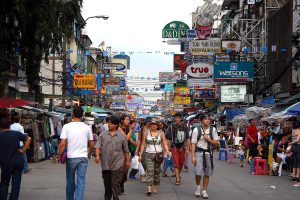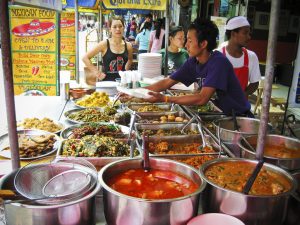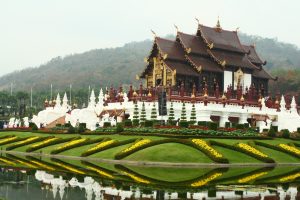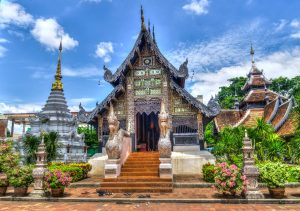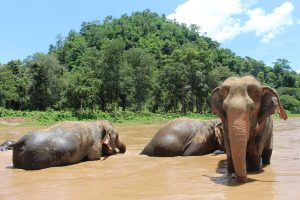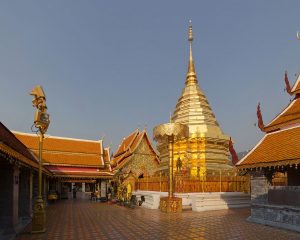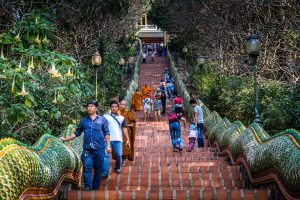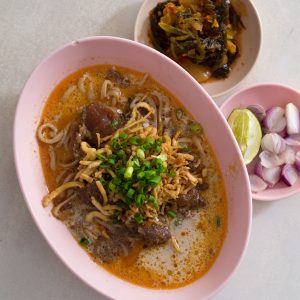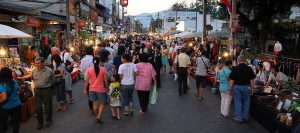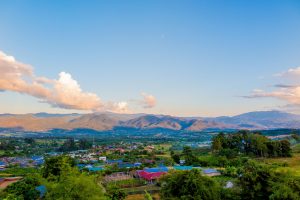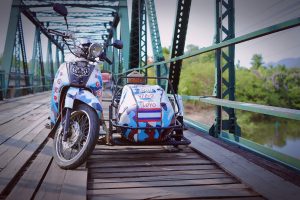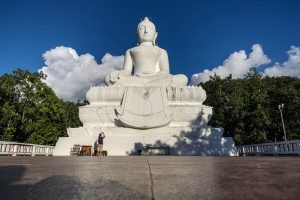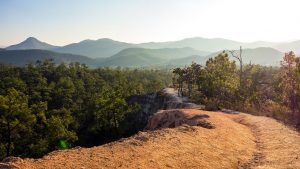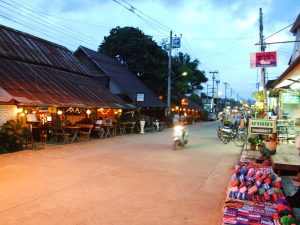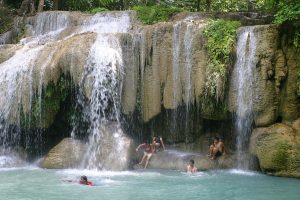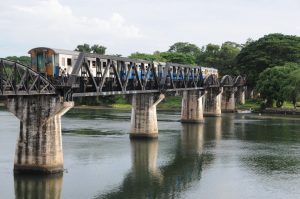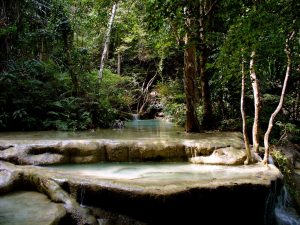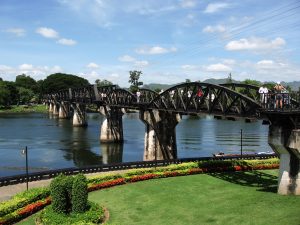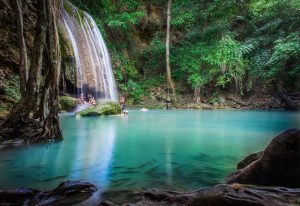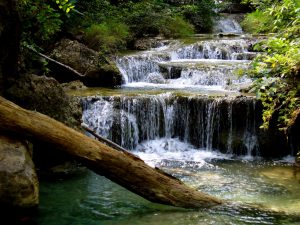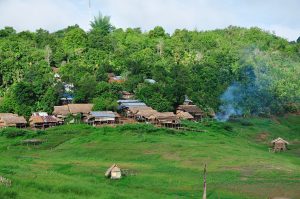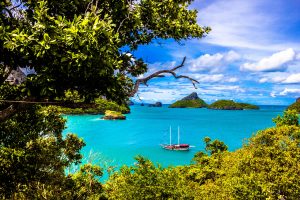They don’t call it “The Land of Smiles” for nothing…
Yep, we’re talking about Thailand today! It’s a country that’s close to my heart, having spent several months there during my maiden backpacking adventure.
Thailand really does have something for everyone. There’s the notoriously cheap and crazy nightlife in Bangkok, breathtakingly beautiful beaches in the south, and a vibrant culture to immerse yourself in.
So let’s get to it! Here’s your traveler’s guide to Thailand...
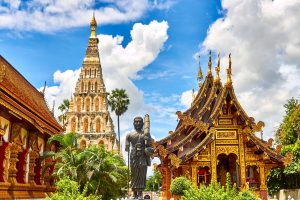 Photo by Mathew Schwartz on Unsplash
Photo by Mathew Schwartz on Unsplash
Quick Facts:
Capital: Bangkok
Language: Thai (although English is widely spoken)
Currency: Thai baht (1 Thai baht = 0.030 American dollars)
Population: 68.23 million
Size: 514,000 km2
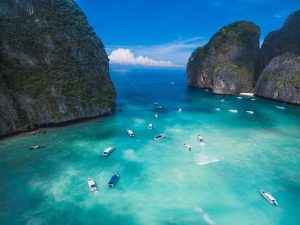 Photo by Humphrey Muleba on Unsplash
Photo by Humphrey Muleba on Unsplash
Bangkok
Odds are if you travel to Thailand, your entry port will be Bangkok. So what better place to start our guide?
Bangkok is an assault on the senses. Actually, scratch that. Bangkok is all-out warfare on the senses. It’s loud, it’s crazy, it’s beautiful, it’s ugly, it’s ALIVE. It really is unlike any city I’ve ever been in.
You may well find there’s a certain adjustment period when you first arrive, but when it’s over, there’s a great city teeming with opportunities to explore.
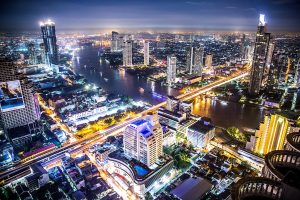 Photo by Braden Jarvis on Unsplash
Photo by Braden Jarvis on Unsplash
What To See:
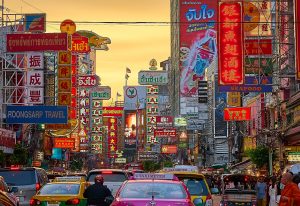 Photo by Geoff Greenwood on Unsplash
Photo by Geoff Greenwood on Unsplash
The Grand Palace
You’ll almost certainly have seen a picture of Bangkok’s Grand Palace before. If not on the front cover of a glossy travel guide, then on the Facebook wall of, at least one of, your friends. And believe me, it’s even more impressive in the flesh.
The Grand Palace, home to Thai royalty up until the 20th century, is truly impressive and well worth a visit while you’re in the capital. What’s more, Wat Phra Kaew, the most sacred Buddhist temple in the country (also known as The Temple of the Emerald Buddha) is located within the grounds of the Grand Palace, too.
The two attractions are easily accessible, too. The entrance fee is 500 Bhat for a combined ticket with the option of tour guides and audio tours available for a little extra.
Tip: You must dress conservatively to visit the Grand Palace and The Temple of the Emerald Buddha. That means covering your shoulders and knees. Clothes are available to rent for a small deposit (which you get back after returning the clothing).
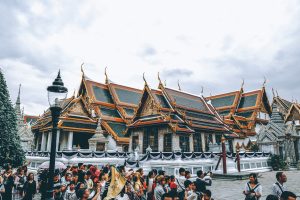 Photo by Hanny Naibaho on Unsplash
Photo by Hanny Naibaho on Unsplash
Khaosan Road
If chugging a questionable concoction of cheap booze from a fishbowl, repeatedly being asked if you want to see a “ping pong show,” and big crowds are your thing, Khaosan Road is for you. It’s loud, it’s lewd, and it can be a lot of fun. If this sounds like hell to you, at least take a quick trip up Khaosan Road for the buzzing atmosphere.
Where To Eat
Street food! (As you’ll soon see, this will become a bit of a trend). Vendors selling street food are EVERYWHERE in Bangkok and you just have to try some of the dishes– do yourself a favor and try something other than pad thai, too! Som tum (spicy papaya salad) and Tom Kha Kai (coconut chicken soup) were among my favorites!
Tip: If the locals are eating there, the food is good!
Where To Stay
Accommodation ranges from absolute dive hostels to 5 star luxury hotels in Bangkok. If you shop around a little, you’ll be able to snag a bed in a dorm room in a decent, clean hostel within walking distance of the action for as little as $7-$10 a night.
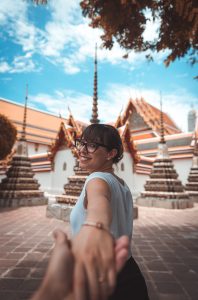 Photo by Fabio Spinelli on Unsplash
Photo by Fabio Spinelli on Unsplash
Watch Out For
A common scam in Bangkok, among many, is Tuk Tuk drivers telling you popular attractions, like The Grand Palace, are closed because of public holidays, ceremonies or other reasons! They’re lying and will try to take you on a pricey tour of other sites instead. Ignore them and carry on.
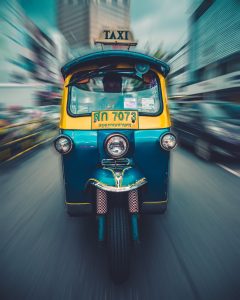 Photo by Max Bender on Unsplash
Photo by Max Bender on Unsplash
The Southern Islands:
The Southern Thai Islands offer the picturesque white-sand beaches, emerald waters, and once-in-a-lifetime photo opportunities (if it’s not on Instagram, were you really there?)
But there’s a whole host of islands to choose from. Ideally, time permitting, you’d explore them all at your leisure. But I’m guessing that’s not an option for a lot of people. So which island do you choose? Well, it all depends on what you’re after.
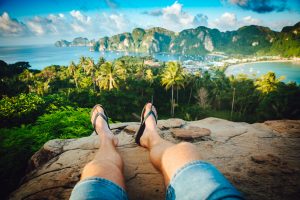 Photo by Evan Krause on Unsplash
Photo by Evan Krause on Unsplash
Koh Pha Ngan - For The Party People
It’s the notorious one. Koh Pha Ngan is home to the infamous full-moon parties (and half-moon parties, and black-moon parties… it’s home to a lot of parties ok). And the island pretty much revolves around drinking. There are some secluded spots, but if you’re not looking to party hard, you’ll probably want to give Koh Pha Ngan a pass.
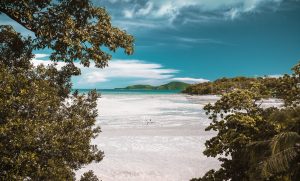 Photo by Vitaly Sacred on Unsplash
Photo by Vitaly Sacred on Unsplash
Koh Tao - For The Scuba People
Pretty little Koh Tao is renowned for its scuba diving scene. After all, it’s one of the best (and cheapest) places to learn. But when you’re done in the water, there are some awesome hikes to enjoy through the coastal jungles. Talk about #instaworthy. Plus, to top it off, Koh Tao has a decent nightlife, too.
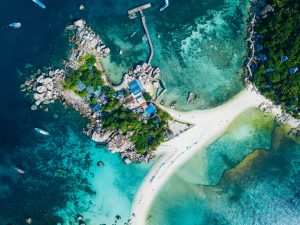 Photo by Max Boettinger on Unsplash
Photo by Max Boettinger on Unsplash
Koh Samui - For The Family People
Koh Samui is Thailand’s second largest island. In the past, Koh Samui was just another stop off on the backpacking route. But things are a little different now. It’s grown up, and it’s gotten ever so sophisticated. The island still offers the white-sand beaches, coconut groves, and emerald waters, but where you might find rather shabby beach huts and “cheap and cheerful” accommodation elsewhere, Koh Samui offers upscale resorts and elegant spas.
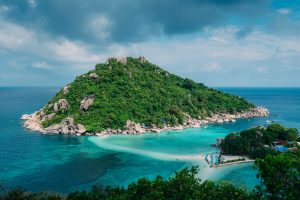 Photo by Samule Sun on Unsplash
Photo by Samule Sun on Unsplash
The North Of Thailand
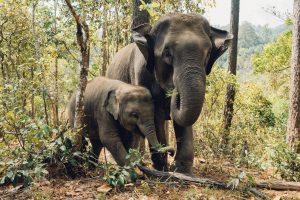 Photo by paweldotio on Unsplash
Photo by paweldotio on Unsplash
Chiang Mai
Chiang Mai is the largest city in northern Thailand. But despite its size, Chiang Mai maintains a breezy, laid-back atmosphere… quite the opposite of Bangkok!
Don’t let that fool you though! There’s an absolute ton to do in Chiang Mai, and come sundown, the enormous night markets teeming with people are a sight to behold.
What To See
Elephant Sanctuaries
The best thing I did in Chiang Mai, and all of Thailand for that matter, was visit the Hug Elephant Sanctuary.
Before visiting Thailand, I was oblivious to how cruel it is to ride an elephant– phajaan the method of “breaking” an elephant to make it submissive enough to ride is truly horrifying. So, when I discovered Chiang Mai is home to several sanctuaries that care for elephants that were previously employed in the tourist trade, I was keen to check it out.
And what a day it was! Feeding, bathing, and having an almighty mud fight with a group of elephants who clearly adore where they live (and those that look after them) was a heart-warming blast. Specifics vary depending on the sanctuary you visit, but the price of my ticket covered travel to and from my accommodation, lunch for the day, and a donation to the sanctuary itself to pay for food and general care for the elephants.
Doi Suthep
If you can ride a scooter, I thoroughly recommend renting one and taking the trip up to Doi Suthep. (Please be careful though, Thai roads can be intense.)
Riding the winding road, occasionally bathed in sunlight as it breaks through the canopy of trees, up the mountain that rises above the west side of Chiang Mai is an exhilarating experience in itself. And Wat Phra That Doi Suthep, the temple that waits atop the summit, is quite stunning.
At the top of a steep stairway, flanked on both sides by dancing dragons, ceremonial umbrellas and altars dazzle in the sun. The gold chedi in the upper terrace rises majestically skyward. Even for the non-religious, it’s thoroughly impressive.
The cherry on top of Wat Phra That Doi Suthep is the breathtaking panoramic views of the city below. You’ll probably visit a lot of temples and wats in Thailand, but this one takes some beating.
Where To Eat
Street food is the order of the day once again in Chiang Mai. And the best place to get it is at the brilliant night markets. By night the renowned night bazaar, running along The Chang Khlan from Tha Pae to Loi Kroh is the place to be. There are hundreds of stalls selling a range of food, tourist trinkets, and clothes.
Where To Stay
Accommodation in Chiang Mai is pretty similar to Bangkok. There’s something for every price range. For the backpacking crowd, you can find a bed in a dorm in a clean, centrally located hostel for a little over $5 a night.
Pai
Nestled in the mountains some 150 km north of Chiang Mai, lies the hippie enclave of Pai. Renowned for its ‘chilled vibes man’, stunning surrounding scenery, and a collection of questionable haircuts, Pai has become a popular pit stop for backpackers looking to relax after the fast pace of major cities and stress of long journeys.
A note on getting to Pai: If you visit Pai, odds are you’ll be arriving from Chiang Mai. And your only real option is a minibus or riding your own motorcycle up a precariously winding road, featuring no less than 726 bends. Bring your sick bag.
What To See:
To be honest, the main draw of Pai is simply chilling out for a little while. But there are some excellent sites to see if you get bored.
Sunset at Wat Phra That Mae Yen (White Buddha)
The giant, pearly white Buddha sitting atop a small hill a few minutes from downtown Pai, is impressive in itself. But for the full experience, you have to visit at sunset. Watching the sun slowly sink behind the mountains opposite is nothing short of beautiful. Such a phenomenon is rarely free of hordes of tourists, however, and here it’s no different. Arrive early for a good spot.
Pai Canyon
About a ten-minute scooter ride from town, you’ll find Pai Canyon. Climb the steep flight of steps, and you’ll be rewarded with panoramic views of the countryside. Narrow ledges jut out from the mainland, with heart-stopping, sheer drops on either side. Daredevils can edge out along the ledges for good photo opportunities but for those who aren’t so keen on heights, the view from the much safer mainland is still enough to warrant a visit.
Where To Eat:
To my disappointment, I didn’t find there were quite as many street stalls in Pai compared to the other places I visited in Thailand. Still, there are plenty of restaurants downtown to choose from.
Where To Stay
As usual, hostels are the best bet for the backpacking crowd. And there’s a whole host to choose from in and around Pai, including a semi-famous “circus hostel”. Expect to pay upwards of $5 a night for a room in a dorm.
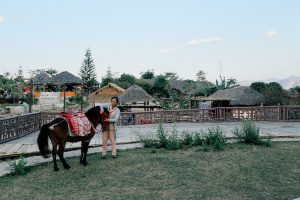 Photo by Bantita Wongwai on Unsplash
Photo by Bantita Wongwai on Unsplash
Personal Pick- Kanchanaburi
One of my personal favorite places from my time in Thailand was Kanchanaburi. Now, you might not find Kanchanaburi featuring too prominently in travel guides and itineraries, but the peaceful, laid-back atmosphere, serene setting, and interesting history really won me over.
After the chaotic hustle and bustle of Bangkok, I was more than ready to chill out and take things easy for a few days, and Kanchanaburi more than catered to my needs. The relaxing train journey from Bangkok, about a three-hour crawl through some glorious scenery, was a sign of things to come.
What To See
The Bridge On The River Kwai, Death Railway, and Hellfire Pass
In the midst of World War 2, the Japanese decided to build a train line from Thailand to Burma – well they decided to force prisoners of war and coerced Asian laborers to build it for them. Unfortunately, tens of thousands lost their lives building the railway, in what was a sad chapter in Thailand’s past.
Kanchanaburi is home to a famous landmark from that chapter, immortalized by the 1957 film– The Bridge On the River Kwai. What’s more, it’s still in use. You can catch a train from Kanchanaburi to Nam Tok that passes right over the bridge. The journey takes roughly two hours and passes through some outstanding scenery. From Nam Tok, you can hire a taxi to take you to Hellfire Pass, roughly 20 minutes away.
Even for those who aren’t history buffs, it’s a memorable experience, complete with fantastic scenery.
Erawan National Park:
How does a beautiful, seven-tiered waterfall cascading through an – equally beautiful forest – into pools of brilliant blue water sound? Yep, Erawan National Park is a pretty solid way to spend a day.
Erawan National Park is located 65 km northwest of Kanchanaburi. Getting there is easy though. Buses run from the station in Kanchanaburi roughly every hour, and take around 90 minutes to arrive at the parks visitor center. A pathway winds through the trees, over rickety wooden bridges and steep stone steps from the base of the falls all the way to the seventh level, complete with fascinating nature, including monkeys! The 2 kms or so to the fifth level is fairly easy going, but from then on a little climbing is required… bring trainers!
Where To Stay
If you do decide to check out Kanchanaburi, you absolutely have to stay in a floating raft house on the river. It’s a quirky experience in itself, being gently rocked to sleep by the soft lulling over the river. And to top it off, the views are absolutely incredible. One of my favorite things to do in Kanchanaburi was to do nothing at all, but sit and relax with a beer, watching the sun go down over the river.
Where To Eat
The northern part of town, home of the famous bridge over the River Kwai, is also where you’ll find the main tourist street and a high concentration of expat bars and restaurants. The food here is decent enough, but for a more authentic dining experience, head to the regular night market.
Hopefully this guide will inspire you to take your next trip in the incredible country of Thailand. Happy travels!


